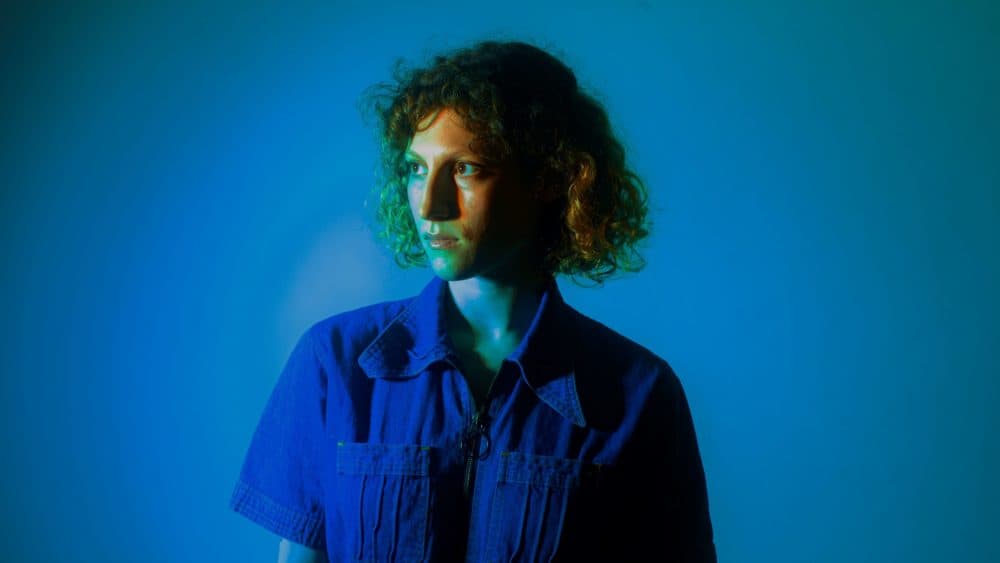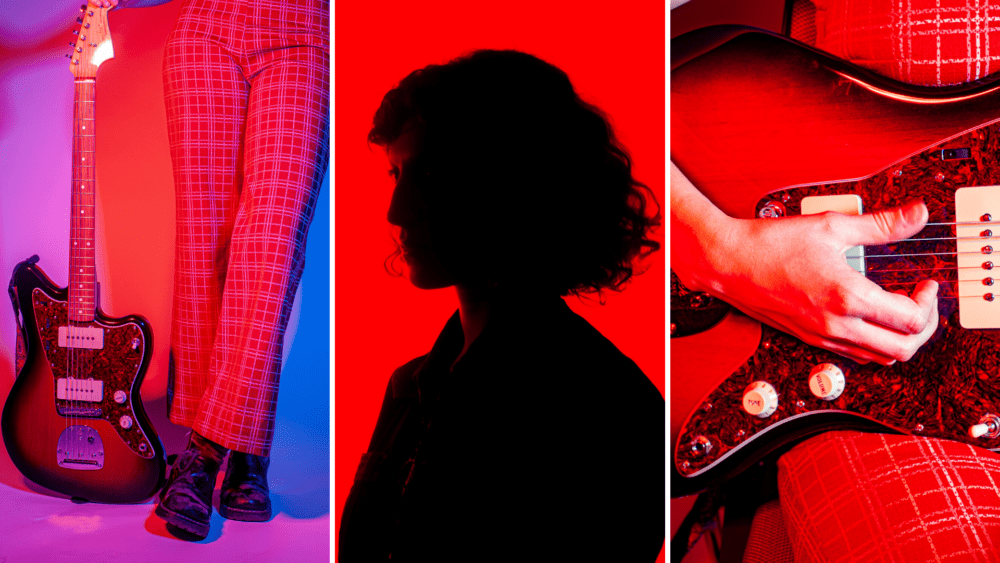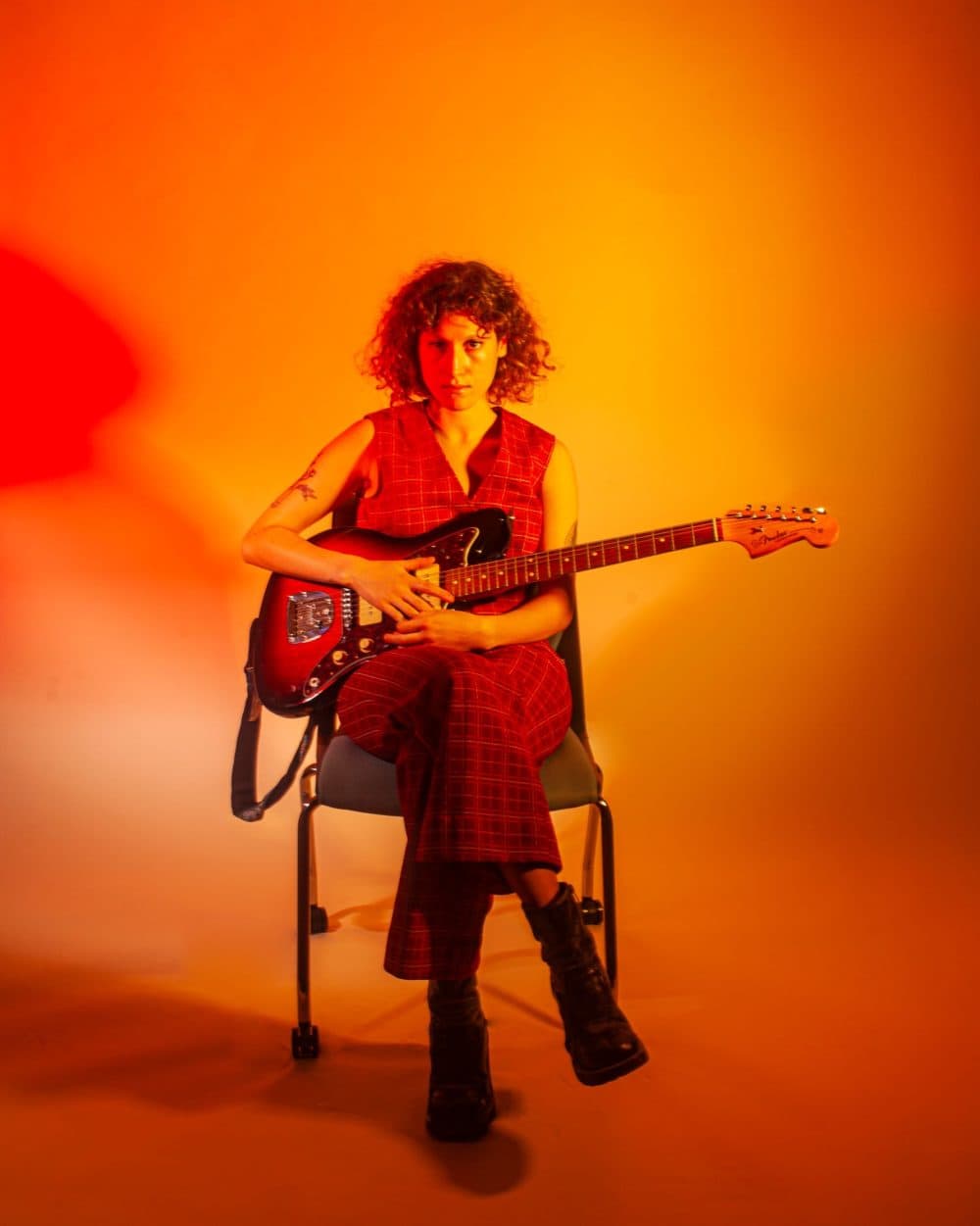Advertisement
Sound On
With Pure Vocals And Brash Guitars, Squirrel Flower Writes Her Origin Story
Resume
This story is part of The ARTery’s ongoing Sound On series, highlighting rising local musicians.
There’s a massive black van with tinted windows in the narrow driveway of Ella Williams’ childhood home in Arlington, Massachusetts. Williams just bought it. “It’s my first car,” she says.

The 23-year-old is sitting in her parents’ small dining room, nursing a hot tea. It’s early January, a few weeks before Williams, who records music as Squirrel Flower, starts a tour of Europe to promote her new album, “I Was Born Swimming.” After that she’ll take the van on tour in the States. (She plays Great Scott in Allston March 7.) “Driving that van around and just being [in] this, like, huge, very masculine vehicle — I feel like I have more power,” she says.
Talk has turned to the van from a discussion of one of Squirrel Flower’s most popular songs, “Not Your Prey,” from her 2016 EP “Contact Sports.” It’s a slowly building number, Williams’ voice clear as a chime over a growling guitar riff and crashy cymbals. “Feel you lurking on the move/ Eyeing my back, making me shiver,” she sings in the chorus. “But if you touch me, I won’t be still/ You’re no predator, I’m not your prey.” Williams says the song is about “feeling really unsafe in a relationship that I was in.” “It’s cliché,” she adds, but writing it made her feel empowered. A stately ascending melody underscores this defiance. But the song ends on an uneasy note, a verse about needing to be “free of the chains that keep me here/ Lying in your arms.” Williams repeats the last line, her voice rising, hovering, a question that’s never resolved.

“Not Your Prey” sounds a lot like “Puberty 2”-era Mitski, another millennial singer-songwriter with lo-fi origins and a knack for lacerating, ambivalent poetry. Squirrel Flower’s music treads territory worn by a number of her slightly senior contemporaries, such as Mitski, Waxahatchee, Soccer Mommy and Lucy Dacus — young female artists whose music is expansive and melancholy and preternaturally sensitive to the taut threads of power that run, invisible, through relationships.
Squirrel Flower is on the rise. In February, Williams was named an “artist you need to know” by Rolling Stone. “I Was Born Swimming” is her first release on Polyvinyl, an indie rock label with a buzzy roster that includes Pitchfork-anointed outfits like Deerhoof and Xiu Xiu, as well as fellow Bostonian Palehound.
The label is billing “I Was Born Swimming” as Squirrel Flower’s “debut album,” which makes sense only if you consider Williams’ first release, the eight-track-long “Early Winter Songs from Middle America,” to be an EP. Williams had already completed “I Was Born Swimming” by the time Polyvinyl signed her. She paid for it with the help of a crowdfunding campaign and tapped Gabe Wax, a producer popular among the indie rock set, to produce it.
If Williams seems unusually fully-formed for such a young musician, there’s a good reason for it. She hails from a family of professionals. Her paternal grandparents, classical musicians, were part of the Gate Hill Co-op, an artistic community in upstate New York with roots at Black Mountain College. Her father, Jesse Williams, is a jazz and blues bassist who toured heavily throughout her childhood. Her older brother, Jameson, is a multi-instrumentalist who sometimes tours with Squirrel Flower, and her younger brother, Nate, has done live sound mixing for the band. "We grew up all making music together," Williams says. She remembers going to the Montreal Jazz Festival, where her dad was performing, and smelling weed for the first time. “I was like, what is this? This smells so weird,” Williams says. “And then just hearing these blues riffs — that was, like, a lot of my childhood.”
Williams joined Boston Children’s Chorus when she was nine. It was a rigorous musical education, and she stuck with it through her teens. Just as important, arguably, was her academic education at the Cambridge School of Weston, a private progressive high school with an emphasis on experiential education. In that charmed environment, she was able to devote much of the school day to playing music and writing songs.
As a teenager, Williams performed under her given name at open mics around town and in what she describes as “folky house concerts.” Toward the end of high school she discovered Boston’s underground rock scene, and fell in love with its distorted guitars and a DIY ethos. She enrolled at Grinnell College, in Iowa, but came home after one semester. (She later returned and completed her degree.) In retrospect, she was depressed. And the music she was making was depressed, too. “I came back here and recorded all of the songs that I had written my first semester, and it just felt so different that I didn’t want to use my name,” Williams says. She chose Squirrel Flower, an alter ego she invented as a kid.
Squirrel Flower’s 2015 debut, “Early Winter Songs From Middle America,” is wistful and rough around the edges; in this spare, moody environment, reverb is as much an instrument as Williams’ voice or her guitar. “What was that?”, the first track, rests on a quirky earworm and lyrics that evoke sadness as much as they describe it. “I guess I’ll go back to sleep,” Williams sings, resigned.

On 2018’s “Contact Sports,” Squirrel Flower’s sound comes into focus in spiraling melodies and dark, thrumming guitar. “A lot of the songs on that EP are about bad relationships,” Williams says. At the time, she was feeling frustrated with the way the young men in her circle failed to hold each other accountable for bad or harmful behavior; she felt it always fell to the women to speak up. “I think that’s why I brought electric, distorted guitar into that. Because I needed to take up space with sound,” Williams says. On “Contact Sports,” she turns a sharp eye to relationships, and the power dynamics that shift tectonically within them. “Your love is so heavy I get weak in the knees,” she sings. “And fool myself that you’re all I need.”
“I Was Born Swimming” continues in the same sonic vein. “Some of the songs on ‘I Was Born Swimming’ are still thinking about power and power politics, a little bit,” Williams says. “But in a much softer way, like a more layered way.” The music on “I Was Born Swimming” often evokes the gently philosophical reverie of a late-night road trip. “Realize I’m not getting older, but I’m not getting younger/ Headlights look different when I’m looking over my shoulder,” Williams sings on “Headlights,” a drone-drenched lullaby.
Williams was born “en caul,” an unusual but harmless occurrence that means she was delivered still encased inside the amniotic sac. The title “I Was Born Swimming” is a reference to this rare origin story. “I was wrapped in this veil full of water, like totally isolated, but also at the same time still connected to the life force that was my mom,” Williams says. The image, she says, offered a handy metaphor for “being independent and solitary" while still connected to other people.
On the album’s title track, water is a more flexible metaphor than Williams' own analysis would suggest. It’s a calm ocean of solitude, and a place you could drown. It’s a baptism. “So dip me in the water,” Williams sings, leaving the melody unresolved. The song is intimate, searching. With it, Williams gestures toward a budding mythology, a sense of self that remains steady even as her view of the world grows larger and more complex, an anchor in a vast and expanding sea.
Squirrel Flower performs at Great Scott on Saturday, March 7, at 8:30 p.m.
Correction: An earlier version of this post misstated the release year of Squirrel Flower's 2016 EP "Contact Sports."
This article was originally published on March 05, 2020.
This segment aired on March 5, 2020.

